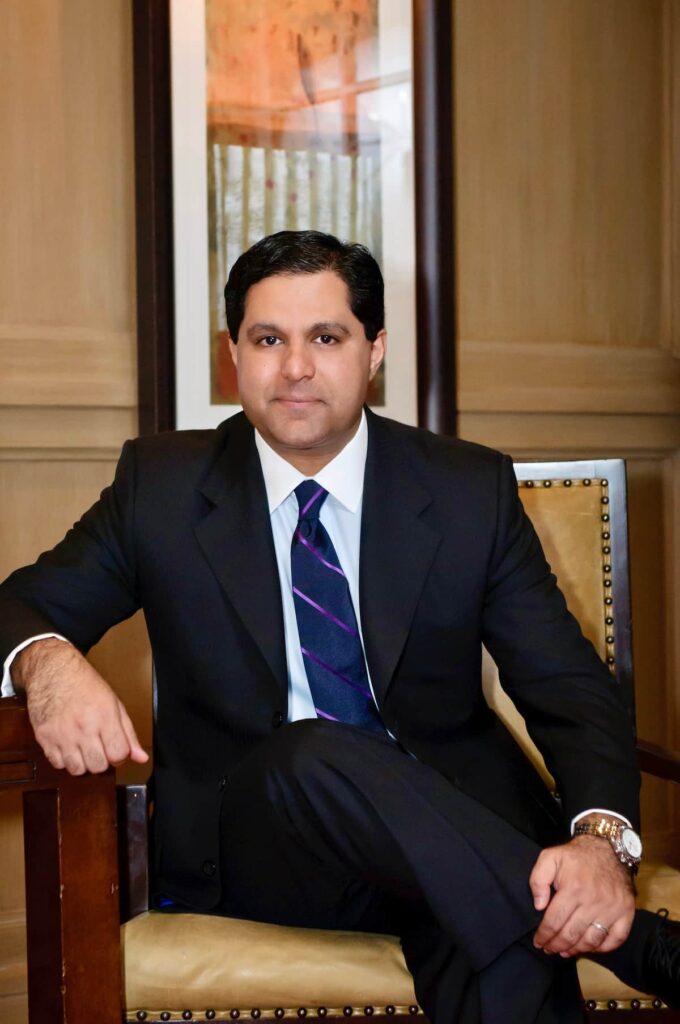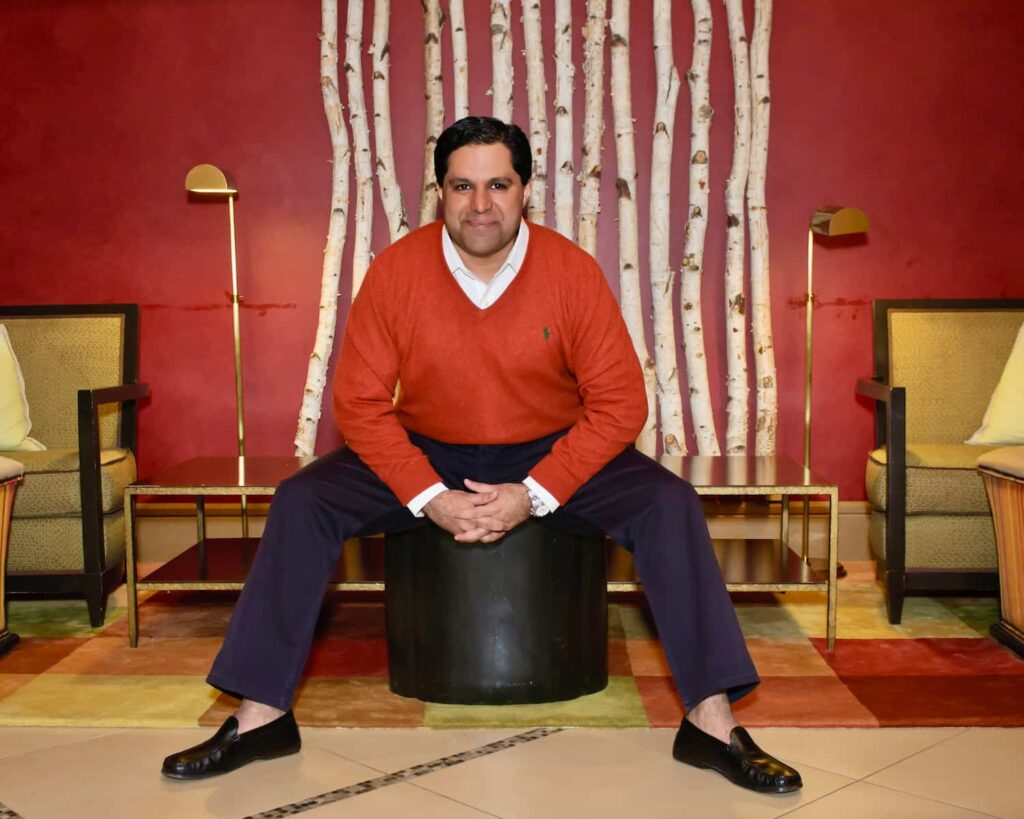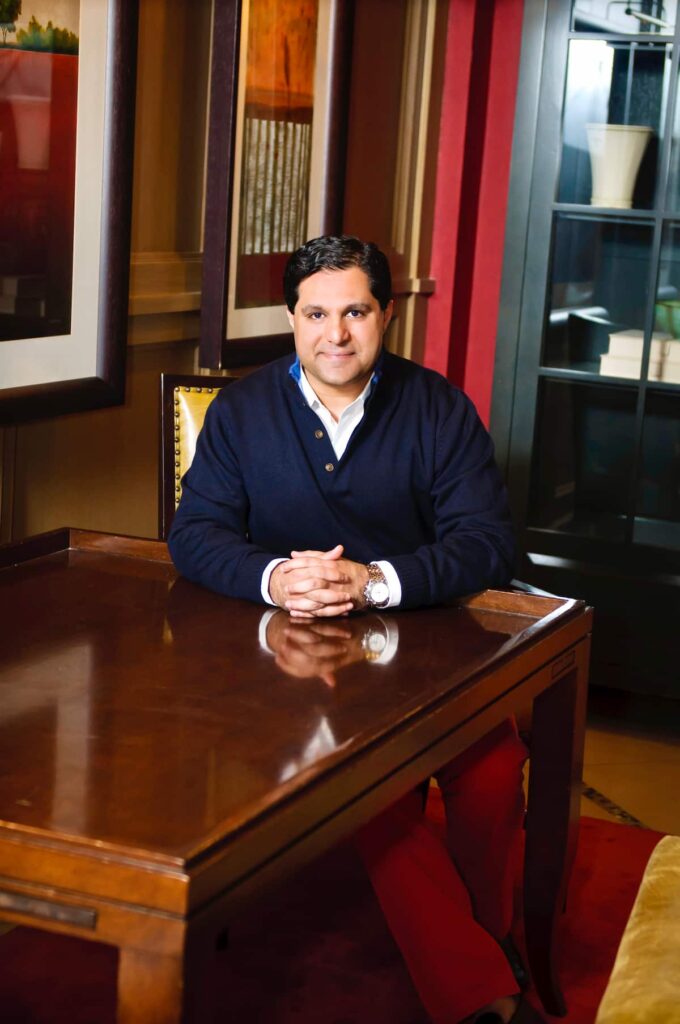
Romy Bhojwani is a seasoned leader in the hospitality industry with 25 years of experience in global hospitality investments, asset management, and hotel real estate transactions. He has built a reputation as a thought leader, known for his strategic innovation, value creation, and ability to deliver strong investment returns. Currently, he leads a hotel asset management platform that focuses on opportunistic, value-add investments in North America, where he continues to drive growth and excellence. At EliteX, we are proud to have Romy Bhojwani as the Cover Story of the Edition: 10 Elite Leaders in Hospitality, 2024.
Romy Bhojwani | Senior Vice President and Head of Asset Management | HHM Hotels
His journey in hospitality began at the age of 17 when he joined The Oberoi Hotel in Mumbai, India, as a Management Trainee. This role provided him with hands-on experience in all major operational areas of a luxury hotel. Determined to learn as much as possible, he often worked double shifts without pay to immerse himself in the industry’s intricacies. This early exposure gave him a deep appreciation for every role in hospitality and reinforced his belief in the power of hard work, attention to detail, and passion for success.
Stay hungry. Stay curious. And most importantly – pay it forward, because the more you grow, the more you can give back to others.
Growing up in India, he pursued two undergraduate degrees simultaneously—a Bachelor’s in Commerce and a degree in Hospitality Management. After gaining industry experience in India, he moved to the United States to further his education at The Hotel School at Cornell University, specializing in real estate. His career then took him to Hilton Worldwide, where he spent about 10 years leading various functions, including Operations & Strategic Planning, Asset Management, and Capital Planning. During this time, he played a pivotal role in executing Hilton’s asset-light strategy, selling over 45 hotels in just three years. He then spent 15 years managing mid to large-sized hotel portfolios globally, working with private equity firms and sovereign funds. He has directly asset managed hospitality real estate valued in excess of $26 Billion and located around the globe. Now, as an owner and investor, he leads a hospitality asset management platform focused on maximizing value in the North American market.
His passion for hospitality was sparked at an early age due to extensive travel across India and abroad. A defining moment came when he visited The Opryland Resort in Nashville at the age of 12 while attending a Rotary Convention. The energy, entertainment, and seamless orchestration of every detail fascinated him and left a lasting impression. This experience cemented his desire to build a career in hospitality. He defines success in hospitality as exceeding the expectations of all stakeholders, including employees, guests, vendor partners, franchisors, owners, and investors. By understanding and prioritizing what matters most to each of these groups, businesses can execute strategies that ensure all stakeholders thrive, ultimately leading to long-term success.
One of the major challenges he has faced in recent years is the difficult hotel transaction environment, which has extended hold periods and delayed investor returns. In commercial real estate, returns are realized upon refinancing or selling an asset, and the current market conditions, including a disconnect between buyers’ and sellers’ valuations and persistently high interest rates, have made transactions more difficult. However, with liquid capital markets, refinancing remains a viable and potentially profitable alternative.
To ensure exceptional guest experiences, he emphasizes the importance of understanding the different segments of demand at each hotel. A data-driven approach helps customize offerings and create memorable stays, leading to long-term loyalty. Additionally, staying true to the hotel’s value proposition is key. In select-service hotels, convenience, cleanliness, and consistency are critical, while luxury resorts focus on creating unique, bespoke experiences that are flawlessly executed. Clearly communicating and consistently delivering on the value proposition ensures guest satisfaction and brand loyalty.
“Innovation should enhance standards, not compromise them.”

The hospitality industry has undergone significant changes in recent years, driven by evolving guest expectations, technological advancements, and a growing emphasis on sustainability. Modern travelers seek immersive and personalized experiences, and the industry has had to adapt by integrating digital solutions such as AI-powered concierge services, mobile check-ins, and smart room technologies. Sustainability has also become a key focus, with properties prioritizing energy efficiency, locally sourced materials, and carbon-neutral operations. To stay ahead, businesses must embrace continuous innovation while maintaining the core principles of hospitality—providing warm and genuine service.
Technology plays an increasingly important role in hospitality, helping enhance guest experiences, optimize operations, and improve profitability. Historically, the industry has lagged behind in technology adoption, but recent developments in AI, data analytics, and digital services are helping to close the gap. The ability to leverage data for more accurate underwriting in acquisitions is another exciting development. As AI continues to evolve, opportunities to optimize labor costs, enhance guest interactions, and refine revenue management strategies will give forward-thinking hospitality businesses a competitive edge.
Balancing high standards with innovation is a crucial aspect of success in hospitality. Maintaining consistency, quality, and seamless service is non-negotiable, but innovation ensures long-term relevance. The key is to integrate technology and new processes in a way that enhances rather than replaces traditional hospitality values. AI-driven guest preference tracking, mobile check-ins, and smart room controls are excellent examples of how innovation can improve efficiency while preserving the human touch that defines great hospitality.

A successful hotel investment is determined by the increase in asset value from acquisition to disposition. Several factors influence asset value, including cash flow, acquisition cost, capital expenditures, leverage, debt financing costs, brand and operator agreements, physical condition, upside opportunities, and capital market strength at the time of monetization. Actively managing these elements is crucial to maximizing value and delivering strong investment returns. For those just starting their careers in hospitality, he offers several key pieces of advice. First, develop a service-first mentality—hospitality is about making people feel valued, and every guest interaction is an opportunity to leave a positive impression. Second, be curious and open to learning, as the industry is dynamic and constantly evolving. Third, master the details—hospitality is an operationally intensive business, and success depends on consistency and execution. Finally, build relationships and seek mentorship. Hospitality is a people-driven industry, and strong professional connections can play a significant role in shaping one’s career path.
With deep expertise and a stellar track record in the hospitality industry, Romy Bhojwani is a visionary leader known for his innovative approach, strategic acumen, and unwavering commitment to excellence. His journey stands as a testament to the power of hard work, adaptability, and the relentless pursuit of perfection – serving as an inspiration for those to aspire to impact the future of hospitality.

“Success in hospitality is about exceeding expectations of all your stakeholders.”